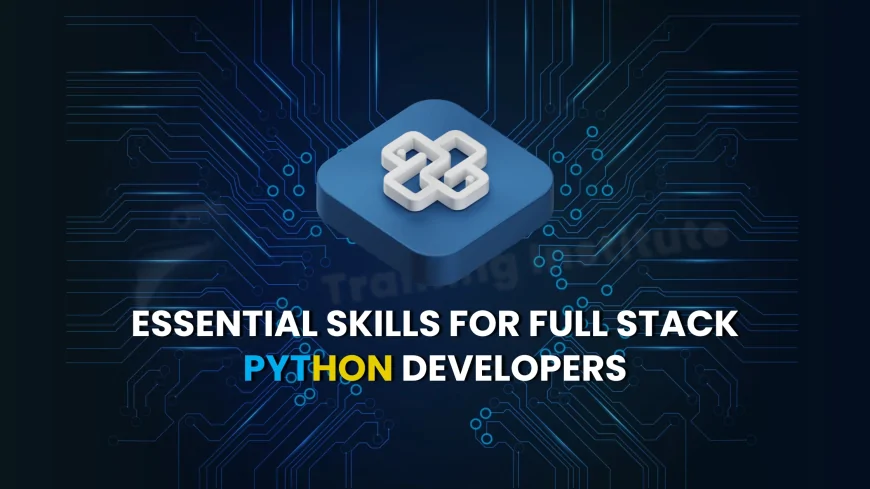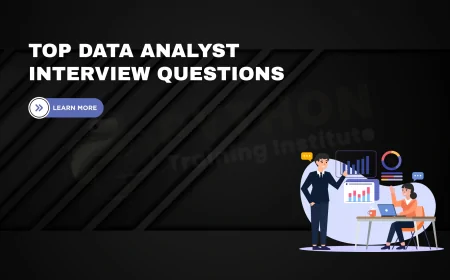Top Skills Needed for a Full Stack Python Developer in Pune | Key Competencies for Full Stack Python Developers in Pune
Explore the top skills required to become a successful Full Stack Python Developer in Pune. Learn about Python, Django, React, DevOps, cloud deployment, and soft skills for a thriving career in 2025.

Table of Contents
- Overview of Full Stack Python Role
- Essential Front‑End Skills
- Must‑Have Back‑End Skills (Python)
- Database & ORM Knowledge
- RESTful API & Integration
- DevOps & Deployment Proficiency
- Cloud & CI/CD Practices
- Testing & Quality Assurance
- Security & Performance Optimization
- Soft Skills & Agile Methodology
- Skill Roadmap by Experience
- FAQs
- Conclusion
Overview of Full Stack Python Role
A Full Stack Python Developer in Pune builds end‑to‑end web applications—creating user interfaces (React/HTML/CSS), server logic (Python/Django/Flask), database integration, deployment, and maintenance. They collaborate across frontend, backend, DevOps, and product teams.
This versatility is crucial as Pune firms—startups and MNCs alike—look for developers who can handle full product life‑cycles efficiently.
Essential Front‑End Skills
- HTML5 & CSS3: semantic markup and responsive design techniques.
- JavaScript & ES6+: modern JS practices—arrow functions, promises, fetch API.
- React.js: component structure, hooks (`useState`, `useEffect`), state management (Context/Redux), React Router.
- UI Frameworks: experience with Bootstrap, Tailwind CSS, Material UI enhances productivity.
Must‑Have Back‑End Skills (Python)
- Core Python: OOP, data structures, decorators, exception handling.
- Django: MVT architecture, ORM, authentication, admin panel.
- Flask: lightweight REST APIs with Blueprints and Jinja2 templates.
- FastAPI: for asynchronous, high-performance APIs (growing industry adoption).
Database & ORM Knowledge
- Relational DBs: MySQL, PostgreSQL—design schemas, write optimized SQL queries
- NoSQL: MongoDB usage via PyMongo for document-based data
- ORM Tools: Django ORM or SQLAlchemy for database abstraction and migrations
RESTful API & Integration
- Design and implement REST APIs with Django REST Framework or Flask-RESTful
- Authentication techniques: JWT, OAuth integration
- API usage in frontend via axios/fetch, handling JSON responses and error states.
DevOps & Deployment Proficiency
- Containerization: Docker and Docker Compose for isolated builds and consistent environments.
- Web Servers: Gunicorn, Nginx for serving Django/Flask apps.
- CI/CD: Basic pipelines via GitHub Actions or Jenkins for automated tests and deployment.
Cloud & CI/CD Practices
- Cloud Platforms: AWS, Heroku, GCP—deploy production applications.
- CI/CD Tools: GitHub Actions, Jenkins to build, test, and deploy code seamlessly.
- Version Control: Git branching, pull requests, collaboration workflows.
Testing & Quality Assurance
- Unit Testing: `unittest`, `pytest` for backend code
- Frontend Testing: Jest for component rendering and functionality :
- Test Automation: Selenium or Playwright for end-to-end browser tests
Security & Performance Optimization
- Web Security: Defense against XSS, CSRF, SQL injection using Django/Flask protections.
- Performance Tuning: Caching with Redis, database indexes, query optimization.
- Profiling: Tools like cProfile, NewRelic for performance monitoring.
Soft Skills & Agile Methodology
- Communication: Explaining designs, collaborating across teams.
- Problem-Solving: Debugging complex issues and constructing efficient algorithms.
- Time Management: Juggling sprints, deadlines, and multiple projects.
- Agile: Working within Scrum/Kanban, participating in standups and reviews.
- Continuous Learning: Adapting to new tools like FastAPI, Kubernetes, React updates.
Skill Roadmap by Experience Level
- 0–1 yr: Python fundamentals, HTML/CSS/JS, Git
- 1–2 yrs: Django/Flask development, SQL, frontend frameworks
- 2–4 yrs: API building, containerization, CI/CD practices
- 4+ yrs: Cloud deployment, microservices, architecture design, DevOps
Frequently Asked Questions
1. Which front-end framework should I learn?
React.js is the most in-demand, widely supported, and ideal for SPAs in full-stack roles.
2. Is Flask enough or should I learn Django?
Both are valuable: Django is comprehensive, while Flask is preferable for lightweight or microservices apps.
3. Do I need to learn FastAPI?
Yes—FastAPI is gaining popularity for building fast, asynchronous Python APIs.
4. Should I know SQL and NoSQL both?
Yes. SQL handles traditional relational data, NoSQL suits flexible schemas and high-scale scenarios.
5. What cloud platforms are commonly used in Pune?
AWS and Heroku are most common, with growing adoption of GCP and Azure.
6. How important is containerization?
Crucial. Docker ensures environment consistency and simplifies deployment workflows.
7. What CI/CD tools should I learn?
Start with GitHub Actions or Jenkins; they support automated testing and deployment pipelines.
8. Do I need to write frontend tests?
Yes. Learning Jest and integration testing ensures UI stability.
9. What about DevOps and Kubernetes?
Basic DevOps is essential; Kubernetes is valuable for scaling but can be learned later.
10. Is knowledge of security mandatory?
Absolutely—security flaws can be costly, so skills like input validation, CSRF protection, and hashing are essential.
11. What soft skill is most overlooked?
Communication—being able to articulate technical ideas clearly across teams is vital.
12. How do I start Agile work?
Join small Scrum/Kanban teams, participate in standups, and work in short sprints to learn the process.
13. How do I practice performance optimization?
Use caching layers (Redis), analyze query plans, and monitor CPU/memory usage in staging environments.
14. Are internships helpful?
Yes—they give real-world practice in deployment, debugging, and collaboration scenarios.
15. How do I stay updated?
Follow blogs, GitHub repositories, community threads (e.g., Reddit r/developersIndia), and practice new tools.
16. Is full-stack development still relevant?
Yes—the versatility remains valuable, especially in startups and niche teams in Pune.
17. Which testing framework should I choose?
Use pytest for backend tests and Jest for frontend testing for a complete test suite.
18. How can I showcase DevOps skills?
Include Dockerized apps and CI/CD pipelines in your portfolio; document the workflow.
19. Should I learn microservices early?
Align learning with needs; start with monoliths, then move to small microservices for scale.
20. How do I improve problem-solving?
Practice coding on LeetCode, participate in hackathons, and simulate debugging real scenarios.
Conclusion
For Full Stack Python developers in Pune, excellence in frontend and backend fundamentals, combined with cloud deployment, testing, and strong soft skills, sets you apart. Embracing continuous growth in DevOps, security, and agile practices will ensure your skills remain in demand through 2025 and beyond.
What's Your Reaction?
 Like
0
Like
0
 Dislike
0
Dislike
0
 Love
0
Love
0
 Funny
0
Funny
0
 Angry
0
Angry
0
 Sad
0
Sad
0
 Wow
0
Wow
0













